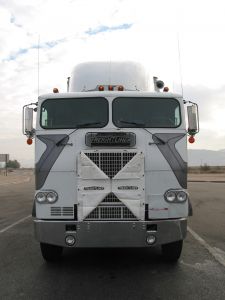Technology helps track hours of service and eliminates paperwork for commercial truckers which could keep them more alert, thereby reducing the risk of Boston trucking accidents.
A regulatory proposal was issued by the U.S. Department of Transportation’s Federal Motor Carrier Safety Administration (FMCSA) requiring installation of electronic on-board recorders (EOBRs) for interstate commercial truck and bus companies to monitor hours-of-service (HOS) compliance by their driver’s.

Our Boston personal injury lawyers applaud the U.S. government in their continued efforts to ensure truckers comply with safety regulations that keep all motorists safe.
In 2008 the National Highway Traffic Safety Administration reported 50,430 vehicles were involved in fatal crashes. A total of 4,066 of these vehicles were large trucks. In Massachusetts there were 444 vehicles involved in fatal crashes in 2008; 20 were large trucks.
Currently truckers keep a log book to document hours of service. Supporting documents such as toll and delivery receipts are used to verify the total amount of time drivers spend behind the wheel. The antiquated system is ripe for abuse and has made a mockery of hours-of-service rules, which are designed to protect motorists from accidents caused by fatigued truckers.
The EOBR’s eliminate the need for retaining all the paperwork, and do more to keep the industry honest. Think of the device as an electronic record keeping system.
“We cannot protect our roadways when commercial truck and bus companies exceed hours-of-service rules,” said Transportation Secretary Ray LaHood. “This proposal would make our roads safer by ensuring that carriers traveling across state lines are using EOBRs to track the hours their drivers spend behind the wheel.”
Several carriers have already installed this technology, including U.S. Express Enterprise, Schneider National, Maverick USA, J.B. Hunt, Knight Transportation and Maverick USA. The proposed rule would affect about 500,000 carriers.
The proposal would require interstate carriers that currently use Records of Duty (RODS) log books to use EOBRs to document hours of service. Carriers that use timecards to document HOS, like short-haul interstate truckers, won’t be required to use EOBRs.
Noncompliance impact a carrier’s DOT operating authority and safety fitness rating negatively. Carriers can be fined up to $11,000 for each offense that violates this EOBR requirement.
“This proposal is an important step in our efforts to raise the safety bar for commercial carriers and drivers,” said FMCSA Administrator Anne S. Ferro. “We believe broader use of EOBRs would give carriers and drivers an effective tool to strengthen their HOS compliance.”
If you or someone you love has been involved in a car accident in Boston or the surrounding areas, contact Jeffrey Glassman Injury Lawyers for assistance. Call for a free and confidential consultation at (617) 777-7777.
 Boston Personal Injury Attorney Blog
Boston Personal Injury Attorney Blog

